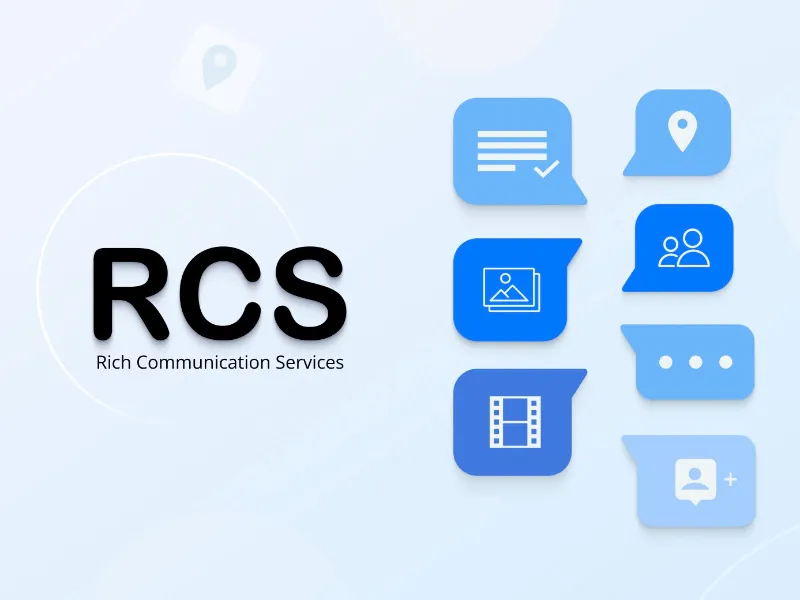- Rich Communication Services (RCS) is an advanced messaging protocol designed to enhance traditional SMS (Short Message Service) and MMS (Multimedia Messaging Service) by offering a richer set of features and a more robust user experience.
- RCS operates over the internet using IP-based communication rather than relying solely on cellular networks.
Rich Communication Services (RCS) is an advanced messaging protocol designed to enhance traditional SMS (Short Message Service) and MMS (Multimedia Messaging Service) by offering a richer set of features and a more robust user experience. Developed by the GSM Association (GSMA), RCS aims to provide an improved messaging solution that supports a wide range of multimedia content, interactive features, and a more seamless communication experience compared to legacy text messaging.
Key Features of RCS
RCS revolutionise messaging by surpassing the limitations of traditional SMS and MMS. Unlike its predecessors, RCS facilitates the exchange of high-resolution images, videos, and audio messages, providing a richer multimedia experience. It also introduces advanced features such as group chats, read receipts, typing indicators, and message status updates, which enhance real-time interaction and feedback, making conversations more engaging and informative.
The integration of rich media is one of RCS’s standout advantages. Users can now share and view interactive content directly within their messaging threads. Features like carousels, maps, and interactive forms transform simple conversations into dynamic interactions, boosting user engagement and functionality. This capability significantly enhances the overall messaging experience by making content more visually appealing and interactive.
For example, during the 2021 Tokyo Olympics, the organising committee used RCS to send real-time updates and interactive content to fans. This included dynamic schedules, live event highlights, and interactive maps to help spectators navigate the venues. This capability not only made the messaging experience more engaging but also ensured fans had timely and visually appealing information at their fingertips.
For businesses, RCS offers a powerful new channel for customer engagement. It allows companies to send branded messages with personalised offers, notifications, and customer service updates that include rich content and interactive elements. This not only improves the effectiveness of communications but also helps businesses create a more engaging and memorable experience for their customers. By leveraging RCS, companies can elevate their messaging strategies and foster stronger connections with their audience.
Consider the case of H&M, which uses RCS to enhance its communication with customers. Through RCS, H&M sends personalised messages featuring interactive product carousels, exclusive offers, and real-time updates on order statuses.
Also read: Apple’s iOS 18 update supports RCS messages
Also read: Samsung’s New AD borrows the story of Romeo and Juliet to call on Apple to support RCS
Implementation and Adoption
RCS operates over the internet using IP-based communication rather than relying solely on cellular networks. It is designed to work across various devices and operating systems, and its implementation is typically supported by mobile carriers and device manufacturers. As a result, RCS messages are delivered through the native messaging app on smartphones, providing a seamless experience for users without requiring third-party applications.
Benefits and Challenges
RCS significantly enhance the messaging experience by offering a feature-rich, interactive alternative to traditional SMS. By integrating directly into native messaging apps on smartphones, RCS streamlines communication without the need for additional applications. Its advanced capabilities improve user experience, allowing for high-resolution media sharing, read receipts, and real-time interactions. Additionally, RCS incorporates encryption and security measures to safeguard user data, though the effectiveness of these protections can vary by carrier and service provider.
However, the widespread adoption of RCS faces several challenges. The technology’s implementation can be inconsistent, with different carriers, devices, and regions offering varying levels of support. This fragmentation can result in an uneven user experience, as not all users may have access to the full range of RCS features. Compatibility issues also arise, as ensuring uniform functionality and feature availability across diverse platforms and networks remains a complex task. These hurdles underscore the need for greater standardisation and collaboration to fully realise RCS’s potential.
The Future of RCS
As the messaging landscape continues to evolve, RCS is poised to play a significant role in shaping the future of mobile communication. With its advanced features and capabilities, RCS has the potential to bridge the gap between traditional SMS and modern messaging platforms, offering a more integrated and engaging experience for users and businesses alike. However, its success will depend on widespread adoption, consistent implementation, and ongoing support from carriers, device manufacturers, and service providers.

